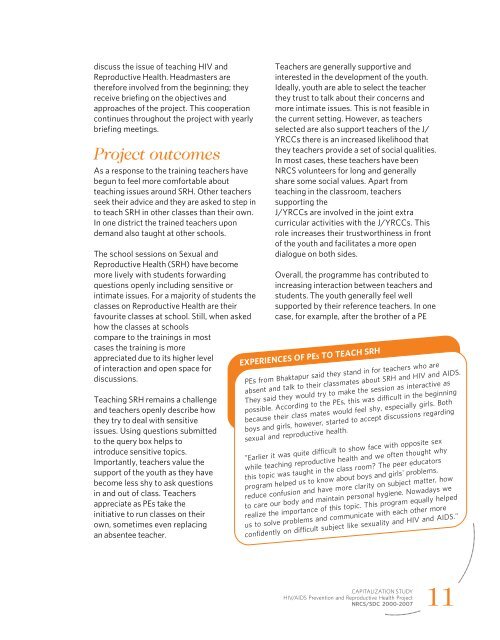HIV/AIDS Prevention & Reproductive Health Project
HIV/AIDS Prevention & Reproductive Health Project
HIV/AIDS Prevention & Reproductive Health Project
You also want an ePaper? Increase the reach of your titles
YUMPU automatically turns print PDFs into web optimized ePapers that Google loves.
discuss the issue of teaching <strong>HIV</strong> and<br />
<strong>Reproductive</strong> <strong>Health</strong>. Headmasters are<br />
therefore involved from the beginning; they<br />
receive briefing on the objectives and<br />
approaches of the project. This cooperation<br />
continues throughout the project with yearly<br />
briefing meetings.<br />
<strong>Project</strong> outcomes<br />
As a response to the training teachers have<br />
begun to feel more comfortable about<br />
teaching issues around SRH. Other teachers<br />
seek their advice and they are asked to step in<br />
to teach SRH in other classes than their own.<br />
In one district the trained teachers upon<br />
demand also taught at other schools.<br />
The school sessions on Sexual and<br />
<strong>Reproductive</strong> <strong>Health</strong> (SRH) have become<br />
more lively with students forwarding<br />
questions openly including sensitive or<br />
intimate issues. For a majority of students the<br />
classes on <strong>Reproductive</strong> <strong>Health</strong> are their<br />
favourite classes at school. Still, when asked<br />
how the classes at schools<br />
compare to the trainings in most<br />
cases the training is more<br />
appreciated due to its higher level<br />
of interaction and open space for<br />
discussions.<br />
Teaching SRH remains a challenge<br />
and teachers openly describe how<br />
they try to deal with sensitive<br />
issues. Using questions submitted<br />
to the query box helps to<br />
introduce sensitive topics.<br />
Importantly, teachers value the<br />
support of the youth as they have<br />
become less shy to ask questions<br />
in and out of class. Teachers<br />
appreciate as PEs take the<br />
initiative to run classes on their<br />
own, sometimes even replacing<br />
an absentee teacher.<br />
Teachers are generally supportive and<br />
interested in the development of the youth.<br />
Ideally, youth are able to select the teacher<br />
they trust to talk about their concerns and<br />
more intimate issues. This is not feasible in<br />
the current setting. However, as teachers<br />
selected are also support teachers of the J/<br />
YRCCs there is an increased likelihood that<br />
they teachers provide a set of social qualities.<br />
In most cases, these teachers have been<br />
NRCS volunteers for long and generally<br />
share some social values. Apart from<br />
teaching in the classroom, teachers<br />
supporting the<br />
J/YRCCs are involved in the joint extra<br />
curricular activities with the J/YRCCs. This<br />
role increases their trustworthiness in front<br />
of the youth and facilitates a more open<br />
dialogue on both sides.<br />
Overall, the programme has contributed to<br />
increasing interaction between teachers and<br />
students. The youth generally feel well<br />
supported by their reference teachers. In one<br />
case, for example, after the brother of a PE<br />
EXPERIENCES OF PES TO TEACH SRH<br />
PEs from Bhaktapur said they stand in for teachers who are<br />
absent and talk to their classmates about SRH and <strong>HIV</strong> and <strong>AIDS</strong>.<br />
They said they would try to make the session as interactive as<br />
possible. According to the PEs, this was difficult in the beginning<br />
because their class mates would feel shy, especially girls. Both<br />
boys and girls, however, started to accept discussions regarding<br />
sexual and reproductive health.<br />
"Earlier it was quite difficult to show face with opposite sex<br />
while teaching reproductive health and we often thought why<br />
this topic was taught in the class room? The peer educators<br />
program helped us to know about boys and girls' problems,<br />
reduce confusion and have more clarity on subject matter, how<br />
to care our body and maintain personal hygiene. Nowadays we<br />
realize the importance of this topic. This program equally helped<br />
us to solve problems and communicate with each other more<br />
confidently on difficult subject like sexuality and <strong>HIV</strong> and <strong>AIDS</strong>."<br />
CAPITALIZATION STUDY<br />
<strong>HIV</strong>/<strong>AIDS</strong> <strong>Prevention</strong> and <strong>Reproductive</strong> <strong>Health</strong> <strong>Project</strong><br />
NRCS/SDC 2000-2007<br />
11

















